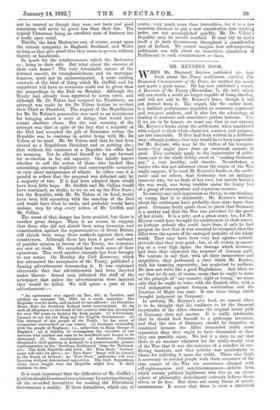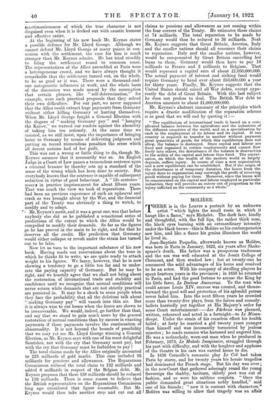MR. KEYNES'S BOOK.
WHEN Mr. Maynard Keynes- published his first book about the Peace settlement, entitled The Economic Consequences of the Peace, he startled the world and made a great name. He has now published a sequel, A Revision of the Treaty (Macmillan, 7s. 6d. net), which will not startle a world no longer capable of being startled, and will not add to Mr. Keynes's fame, though it will not detract from it. The sequel, like the earlier book, is a brilliant performance regarded as economic argument and compact analysis, and it also has the advantage of dealing in sardonic and sometimes pitiless humour. Yet, if we are to be honest, we must say that in our opinion Mr. Keynes's books about the settlement, when considered with regard to their whole character, manner, and purpose, are not admirable. If they had been written in a different way—though perhaps that way would have been impossible for Mr. Keynes, who may be the victim of his tempera- ment—they might have done an enormous amount of good. They certainly apply to the insincerities of politi- cians, and to the whole frothy creed of " making Germany pay," a very healthy, cold douche. Nevertheless, a reader who was not informed about the origin of the War might suppose, if he read Mr. Keynes's- books on the settle- ment and no others, that Germany was an unhappy innocent who, for no fault of her own, but merely because she was weak, was being trodden under the heavy feet of a group of unscrupulous and rapacious enemies. To convey any such impression as that is; to our thinking, so wrong that it is deplorable. Mr. Keynes's writings about the settlement have probably done more harm than good. Germans freely quote them to prove- that Germany is a martyr and that the War was provoked by the greed of her rivals. It is a pity, and a great irony, too, for Mr. Keynes could have brought his -countrymen to their senses, as perhaps nobody else could have done, if only ho had grasped the fact that it was essential to recognize that the Allies were the agents of the outraged morality of the whole world; They may have been very bad agents—nobody pretends that they were good—but, at all events, in assess- ing at a very high figure the damage which Germany had done they expressed the measure of German guilt. We venture to say that, with all their insincerities and stupidities, they performed a duty which Mr. Keynes, with his taunting superiority, has neglected to -perform. He does not write like a good Englishman. And when we say that we do not, of course; mean that he ought to write on the principle of" my country, right-or-wrong," we mean only that he ought to write with the- English ethos, with a real indignation against German materialism and the Doctrine of Might run mad. It was those things which brought• judgment on Germany. In noticing Mr. Keynes's new book we cannot allow it to be thought that his readiness to let the financial ineptitudes of the Allies obscure the original moral guilt of Germany does not matter. It is really intolerable that he should lend himself to a grotesque inversion, and that the sins of Germany should be forgotten or condoned because the Allies demanded much more reparation than they ought to have demanded or than they can possibly exact. We feel it a duty to say that there is no warrant whatever for the wishy-washy view of the War that it was the outcome of a number of con- flicting interests, and that nobody was particularly to blame for inflicting it upon the world. Those who think it necessary to remind people with short memories of the true causes of the War are sometimes charged with self-righteousness and sanctimoniousness—defects from which certain political highbrows who live in an atmo- sphere of philosophic detachment seriously believe them- selves to be free. But there are •many forms of sancti- moniousness. It seems that there is even a statistical, sanctimoniousness of which the true character is not disguised even when it is decked out with caustic humour and effective satire.
, At the beginning of his new book Mr. Keynes states a possible defence for Mr. Lloyd George. Although we cannot defend Mr. Lloyd George at many points in con- nexion with the settlement, the case for him is much stronger than Mr. Keynes admits. He has tried steadily to bring the settlement round to common sense. The representatives of the Allies assembled at Paris were a heterogeneous crowd, and we have always thought it remarkable that the settlement turned out, on the whole, to be as good as it was. There were a thousand-and- one antagonistic influences at work, and the whole basis of the discussion was made unreal by the assumption that certain phrases, like " self-determination," for example, were such practical proposals that they solved their own difficulties. For our part, we never supposed that the Allies could extract huge payments from Germany without either killing Germany or hurting themselves. When Mr. Lloyd George fought a General Election with the slogans of " making Germany pay " and " hanging the Kaiser," we warned our readers against the absurdity of taking him too seriously. At the same time we insisted, as we still insist, upon the importance of bringing home to Germany by means of delivering judgment and putting on record tremendous penalties the sense which all decent nations had of her guilt.
This was not a wrong or futile thing to do, though Mr. Keynes assumes that it necessarily was so. An English Judge in a Court of Law passes a tremendous sentence upon a criminal because he thereby sets up a standard of the sense of the wrong which has been done to society. But everybody knows that the sentence is capable of subsequent reduction in virtue of good behaviour. A " life sentence " aware in practice imprisonment for about fifteen years.
That was much the view we took of reparations. There had been no previous experience of such an upheaval and crash as was brought about by the War, and the financial part of the Treaty was obviously a thing to watch, to modify and to adapt.
Mr. Keynes's merit, and it was a great one, was that before anybody else did so he published a sensational series of predictions of the extent to which the Allies would be compelled to modify their demands. So far as the figures go he has proved in the main to be right, and for that he deserves all the credit. His prediction that Germany would either collapse or revolt under the strain has turned out to be false.
Now let us turn to the important substance of his new book. Having made our reservations about the tone in which he thinks fit to write, we are quite ready to attach weight to his figures. We fancy, however, that he is now showing a tendency to go a little too far and to under- rate the paying capacity of Germany. But he may be right, and we heartily agree that we shall not bring about the restoration of international trade and stability and confidence until we recognize that normal conditions will never return while demands that are not strictly practical are persisted in. It may be a shock to some people when they face the probability that all the delirious talk about " making Germany pay ' will vanish into thin air. But it is always wise to cut losses when the losses are shown to be irrecoverable. We would, indeed, go further than that, and say that we stand to gain much more by the general restoration of normal conditions than by success in exacting payments if those payments involve the continuation of abnormality. It is not beyond the bounds of possibility that we may yet see Mr. Lloyd George winning a General Election, as Mr. Keynes says with one of his most delightful flourishes, not with the cry that Germany must pay, but with the cry that Germany must be forbidden to pay The total claims made by the Allies originally amounted to 225 milliards of gold marks. This sum included 95 milliards for pensions and allowances. The Reparations Commission reduced the total claim to 132 milliards and added 6 milliards in respect of the Belgian debt. Mr.
Keynes proposes that these 138 milliards should be reduced to 110 milliards. There is some reason to believe that the British representative on the Reparations Commission long ago considered that figure reasonable. But Mr. Keynes would then take another step and cut out all claims to pensions and allowances as not coining within the four corners of the Treaty. He estimates these claims at 74 milliards. The total reparation to be made by Germany would thus be reduced to 36 milliards. Next Mr. Keynes suggests that Great Britain, America, Italy and the smaller nations should all renounce their claims to reparation. Italy and the smaller nations, however, would be compensated by Great Britain cancelling her loans to them. Germany would then have to pay 18 milliards to France and 3 milliards to Belgium. That would represent a capital sum of about £1,050,000,000. The actual payment of interest and sinking fund would require Germany to hand over about £63,000,000 a year for thirty years. Finally, Mr. Keynes suggests that the United States should cancel all War debts, except appa- rently the debt of Great Britain. With this last subject he does not profess to deal. The British War debt to America amounts to about £1,000,000,000.
Mr. Keynes's abstract summary of the principles which require a drastic modification of the reparation scheme is so good that we will end by quoting it :— " The equilibrium of international trade is based on a com- plicated balance between the agriculture and the industries of the different countries of the world, and on a specialisation by each in the employment of its labour and its capital. If one country is required to transfer to another without payment great quantities of goods, for which this equilibrium does not allow, the balance is destroyed. Since capital and labour are fixed and organised in certain employments and cannot flow freely into others, the disturbance of the balance is destructive to the utility of the capital and labour thus fixed. The organi- sation, on which the wealth of the modern world so largely depends, suffers injury. In course of time a now organisation and a new equilibrium can be established. But if the origin of the disturbance is of temporary duration, the losses from the injury done to organisation may outweigh the profit of receiving goods without paying for them. Moreover, since the losses will be concentrated on the capital and labour employed in particular industries, they will provoke an outcry out of proportion to the injury inflicted on the community as a whole."



































 Previous page
Previous page